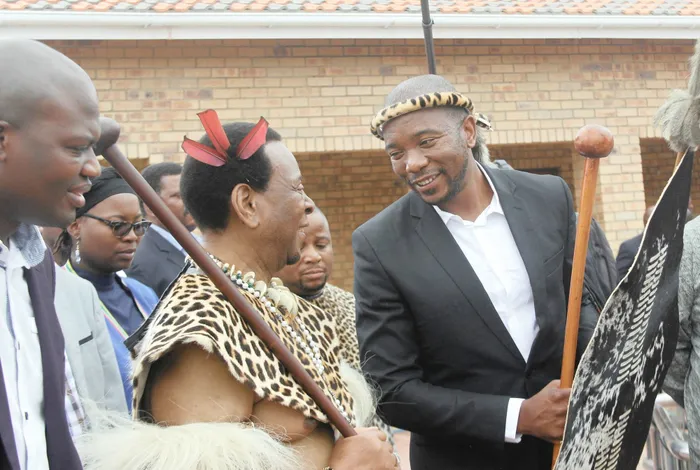
DA leader Mmusi Maimane meets King Goodwill Zwelithini in Nongoma. Photo: File DA leader Mmusi Maimane meets King Goodwill Zwelithini in Nongoma. Photo: File
DURBAN - The Ingonyama Trust has been in the headlines over recent months as a number of political figures have called for the trust to be dissolved.
Here are the facts you need to know about the Ingonyama Trust and why it is so important.
The trust was created in 1994 by the government of KwaZulu-Natal in terms of the KwaZulu Ingonyama Trust Act, (Act No 3KZ of 1994).
The trust holds all the land that owned or belonged to the KwaZulu-Natal government. Under the trust, 2,8 million hectares of land is administered by King Zwelithini, however, the value of the trust is not known.
According to the Ingonyama Trust website, the trust has the mandate to hold land for the benefit, material welfare and social well-being of the members of the tribes and communities that live in the land.
The Ingonyama Trust nominal owner of the land and it is managed primarily in terms of customary law.
Collectively the land is owned by the clans in respect of each demarcated area.
The land is broken down according to the clans under the leadership of Traditional Leaders (AMAKHOSI) who are responsible to the King in terms of customary law. That is why the King is the sole trustee of the land.
Each clan is entitled through the procedures of customary law to hold ownership of his/her allotment. The land which is owned by the Ingonyama Trust is the property envisaged in Section 25(1) of the constitution.
So while not each every member of the beneficial clans is in possession of a registered title deed in regards to his/her allotment, such ownership is protected by law.
The Board does not normally sell the land because it could result in the lessening of the area of the land in black ownership. The chairman of the board is the King Zwelithini.
The Board is supported by the Secretariat. They are the administrative arm of the Board and carry out and discharge the mandate of the Board.
However, when the situation indicates that a sale is a logical approach and with the permission of the relevant Traditional Council (if any) the land is sold.
The Trust Board prefers to lease the land for use. The ownership of land then stays with the trust and the final transfer in due course to the beneficiaries of the trust.
The High-Level Panel on the Assessment of Key Legislation and Fundamental Change has made the recommendation that the Ingonyama Trust Act should be repealed or amended and the Ingonyama Trust should be collapsed.
Former President Kgalema Motlanthe was the head of the panel.
King Goodwill Zwelithini has warned against any efforts to scrap the Ingonyama Trust Act.
According to the Zulu patriarch in a speech that he delivered at the Battle of Isandlwana commemoration last month, he and his subjects strongly oppose any attempt to remove the Ingonyama Trust Act and that the Zulu Nation will be provoked if it does take place.
During a recent visit to KwaZulu-Natal this past Sunday, Democratic Alliance leader Mmusi Maimane discussed the issue of the Ingonyama Trust with the Zulu monarch.
Maimane said that engagement with the trust about land is needed.
King Zwelithini said that the dissolution of the trust would lead to the land being seized without any compensation.
ALSO READ: FTSE 100 crashes as global markets plunge on inflation fears
